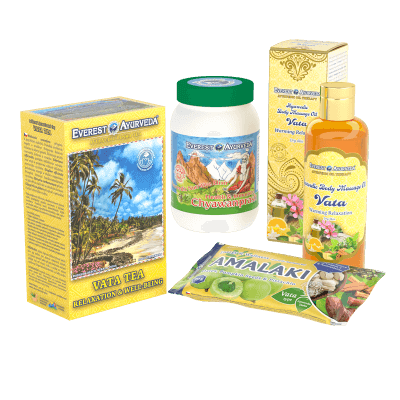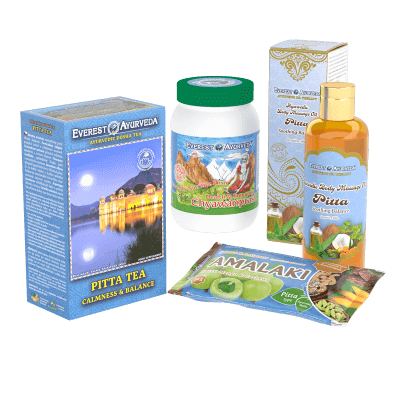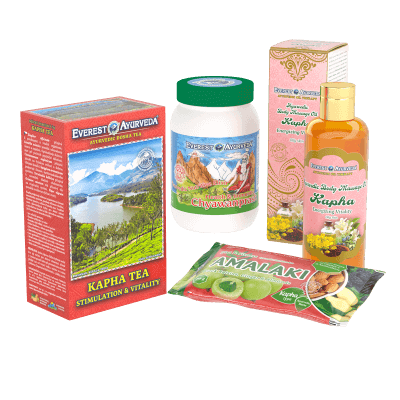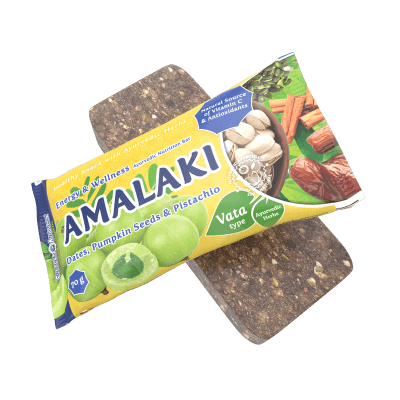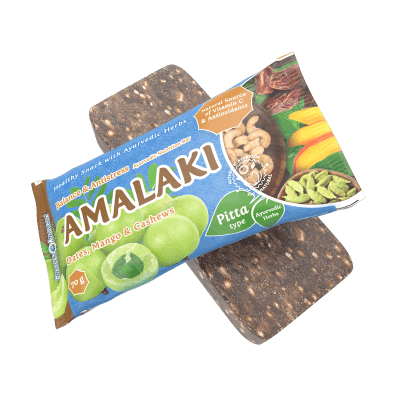
The secret of physical health and good mental condition lies in knowing one's own Ayurvedic Dosha constitution and an active care to maintain its balance within the daily Ayurvedic cycle.
Ayurvedic Cycle and Daily Routine
Ayurvedic medicine works with the concept of biological time, which is related to the activities of the three doshas Vata, Pitta and Kapha, nutrition, digestion and the function of the bodily organs. The daily 24-hour cycle passes through six biological phases that relate to the predominance of the action of each dosha in a given period of the day. The life cycle also occurs in three phases. Childhood (from birth to age 25) is characterized by increased kapha energy. Adulthood (from age 25 to 55) is under the influence of pitta energy and in older age (above 55) vata energy is dominant.
What is Dosha?
Every human being is endowed with an original set of three life principles, which come from the five basic elements that make up nature. The first is a combination of air and ether – 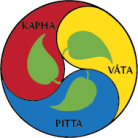 VATA dosha, the second is a combination of fire and water - PITTA dosha and the third is a combination of water and earth KAPHA dosha. The five elements combined in the three basic life forces shape our physical body (kapha), take care of the transformation of food and sensations into energy (pitta), and give space to all the life functions that keep us moving (vata).
VATA dosha, the second is a combination of fire and water - PITTA dosha and the third is a combination of water and earth KAPHA dosha. The five elements combined in the three basic life forces shape our physical body (kapha), take care of the transformation of food and sensations into energy (pitta), and give space to all the life functions that keep us moving (vata).
Discovering which of these are more predominant in us and shape us as we are, including our character traits and health tendencies, gives us a good guide to keeping the various forces in balance, i.e. in the ratio that is innate to us. This is of course different for each person. What is good for us may not be good for others. Therefore, it is always necessary to listen to oneself and choose everything according to the individual constitutional type.
Take the indicative Dosha Test and discover your own constitution!
Ayurvedic Daily Routine
A regular daily routine (dinacharya) that is in accordance with the cycle of the biological clock of the three doshas helps to establish a natural balance in our individual constitution over the long term. It is an integral part of our care for psychosomatic health. This holistic approach represents a suitable lifestyle and complements the Doshic therapies, which through their herbal preparations restore the balance of our constitution, which is disturbed by one of the doshas that become aggravated in the body for various reasons.
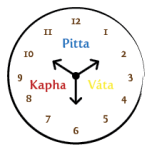 KAPHA Cycle I. (6:00 - 10:00 am)
KAPHA Cycle I. (6:00 - 10:00 am)
Wake up before sunrise and get up before six o'clock. Drink a glass of warm water or lukewarm juice or milk. Empty yourself first and then rinse the back of your head, face and eyes. Brush your teeth and, as part of your oral hygiene routine, scrape the surface of your tongue with gentle strokes from the back to the front using a scraper or the rubber side of the toothbrush. This simple thing helps to remove unhealthy plaque, toxins and non-living bacteria. It promotes good digestion and stimulates the function of internal organs that have reflex points on the tongue. As part of your dental care, you can roll sesame or coconut oil in your mouth and then use your index finger to gently massage your gums (gandusha).
Find a nice meditation corner in your home and place a lit candle in front of you. Close your eyes and focus your attention first on your calm inhalation and exhalation. After each slow inhale, hold your breath for 1-2 seconds in your heart center in the middle of your chest (anahata chakra) and after each quiet exhale, pause briefly before taking your next breath. Feel that you are not breathing in air, but the cosmic energy that flows inside you like a river.
After a few minutes of observing your breath, open your eyes and direct your attention to the candle flame. Imagine a beam of light coming out of it with each breath, entering your heart center in the middle of your chest. Each time you breathe in, try to feel that you are bringing peace, power from the universe and joy into your body. Do this for a few minutes and then silently observe the life energy expanding from your heart center into your entire chest. Finally, chant this matra three times, "My gratitude-heart is all that matters." Through regular practice of meditation, you will feel the quiet presence and radiance of your inner sun, which will accompany you throughout the rest of the day.
After your morning meditation, you can do a full-body massage with warm Ayurvedic oil (abhyanga) and then do yoga, fitness or a light run and finish with a warm shower. Then have breakfast in accordance with your constitution and start the day with enthusiasm. If you indulge in sleep during this cycle, you will get up with more difficulties and you will feel tired, sleepy and exhausted rather than rested.
PITTA Cycle I. (10:00 am - 2:00 pm)
Morning is the most productive time of the day, when we have better concentration and a focused mind. It is the most effective time for intense work activity. Between 12 noon and 2 pm comes lunch time, when the digestive fire (agni) and the process of metabolism is strongest. This is when we should indulge in a tasty and filling meal along with a moment of relaxation in the form of 15 minutes of reading.
Vata type people should have a small but nutritious breakfast, a filling lunch and a warm, satisfying dinner. Pitta-type people should have a light fruity breakfast, a hearty lunch and a medium-sized dinner. Kapha-type people should skip breakfast, a proper lunch should be their main meal, and in the early evening they should have only a very light dinner.
VATA Cycle II. (2:00 - 6:00 pm)
The second part of the work activity should be more related to movement and communication. At the very end of the working day we should have dinner according to our constitutional characteristics.
KAPHA Cycle II. (6:00 - 10:00 pm)
Evening is the best time for relaxation, sports (learn to do sports according to Ayurveda), reading and leisure activities. To maintain physical and mental balance, it is important to start and end the day with breathing exercises and meditation. Therefore, in the evening before going to bed, do the same meditation exercises as in the morning (see Kapha Cycle I) only focus on the lunar qualities of peace, calm and relaxation.
PITTA Cycle II. (10:00 pm - 2:00 am)
In this time comes the deepest and most refreshing sleep. But if we are active late at the night, then the desire for an evening meal comes. We will feel energised then and don't want to go to sleep. By staying awake late at night, the regeneration process of the body is disturbed. The morning is then heavy and sleepy without feeling refreshed. This results in a feeling of exhaustion and fatigue. For a good sleep, it is recommended to sleep on the right side. Vata and pitta type people should go to bed around 10 pm and kapha type should go to bed later around 11 pm and wake up the earliest.
VATA Cycle I. (2:00 - 6:00 am)
This period is the best time for meditation and the development of awakened spiritual consciousness. The time between 3am and 4am is known as the so-called "Hour of God" (Brahma Muhurta), which is used by yogis and mystics as a specially blessed time for the deepest experience of meditation.

